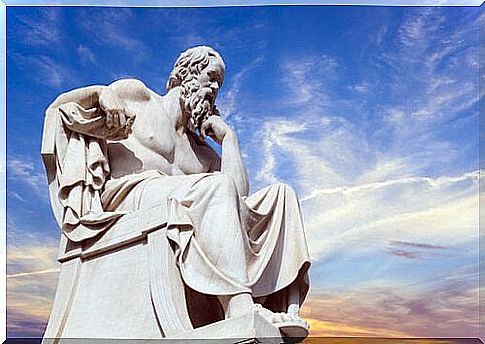A Journey Into The Heart Of Philosophy

Thales of Miletus is considered by many to be the father of philosophy. In the phrase “water is the element and the principle of things” we discover that, in his thought, this liquid element was the heart of life. However, in his mind, he regarded his own person as the heart of philosophy, but was it really born of him?
In this journey into the heart of philosophy we propose you to venture into the dark and dizzying caves of a form of thought that has given rise to an infinite number of theories. Happiness, sadness, hatred, anger, compassion … all this is related to our mind and the philosophical exercise of the human being who tries to give an answer to the meaning of our existence.
Controversial views on the heart of philosophy
Searching for the origin of philosophical thought is by no means easy. Indeed, it is an issue that has raised a lot of controversy throughout history. According to the ancient Greeks, the first philosopher of the 7th century BC was Thales of Miletus, but the matter is not so clear.

At first, the Greeks viewed philosophy as a rational way of thinking. For this reason, he did not need to resort to supernatural elements to explain reality. In addition, they supported the categorical rejection of contradictions, always putting logic in the foreground.
Looking at this Greek definition of philosophy, can we perhaps say that Thales of Miletus was the first thinker in history? Is it possible that there were no others, or at least one other, before him? Are we talking about him because the teachings of other master thinkers have not reached his days?
Hypothesis on the origins of philosophy
Nowadays, there are two schools of thought when it comes to establishing the true heart of philosophy. One theory holds that its origin is in the East, although many others still think it originated in ancient Greece.
The Eastern Origins of Philosophy
For the orientalist current, the hypothesis establishes that the Greeks were mere messengers of philosophy. According to this group of thinkers, the first Hellenic philosophers went to Babylon and Egypt and it is here that they learned mathematics and astronomy, which they then passed on to their culture.
Despite this, this current of thought was supported by the Alexandrian philosophers, at the time of the emperor himself. This current deals openly with the Greek school, so it seems more a way of discrediting it.
Even Christian apologetics supported this theory but, in the end, the Western school rejected these hypotheses which, in reality, sought only a comparison.
In addition, most historical studies show that Babylonian astronomy was based primarily on astrology and divination. Furthermore, Egyptian mathematics lacked a necessary level of abstraction and, therefore, did not cease to be a practical way of measuring land.
The Greek origins of philosophy
The modern currents of thought, on the other hand, almost all of which arose during the twentieth century, consider the Hellenic world as the heart of philosophy. In fact, there are several established rumors that support the following:
The origins of philosophy according to J. Burnet
Burnet argues that philosophy arises in a radical way, as a fruit of the genius of the Hellenic people. He calls it the “Greek miracle”. According to him, the precedents and all the favorable elements do not matter. It is simply a very talented civilization.

The origins of philosophy according to FM Cornford
Cornford argues that the birth of philosophy is at the root of religious thought. All the mythological aspects of their beliefs represent, in reality, a world adapted to reasonable speculation, and is therefore a consequence of it.
The origins of philosophy according to JP Vernant
On the other hand, however, Vernant considers the favorable elements fundamental for the birth of rationality. The lack of a priestly caste, the presence of sages, the pursuit of freedom, writing and the dominance of a constant need for wisdom led to the birth of philosophy.
It is difficult to establish the true heart of philosophy, because human civilization dates back thousands of years. The lack of written evidence makes this research even more difficult, but also very exciting and wonderful. Be that as it may, reason and thought are fundamental in the search for our origins, our world and our truth.









